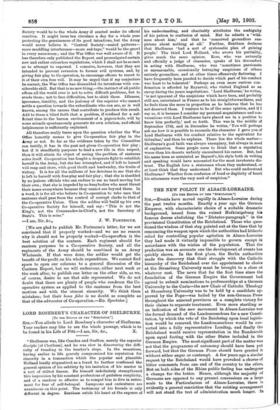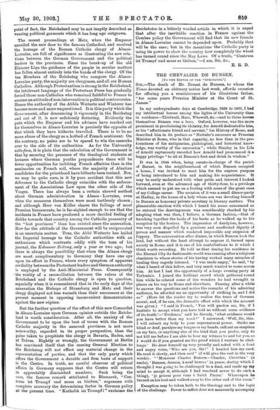THE NEW POLICY IN ALSACE-LORRAINE.
[TO THE EDITOR OP THE 'SPECTATOR.^]
Sin,—Events have moved rapidly in Alsace-Lorraine during the past twelve months. Exactly a year ago the German Emperor, with characteristic choice of a suitable dramatic background; issued from the ruined Hofkonigsburg his famous decree abolishing the " Dictator-paragraph" in the provisional Constitution of the Reichsland. Those who ques- tioned the wisdom of that step pointed out at the time that by renouncing the weapon upon which the authorities had hitherto relied for controlling popular agitation in Alsace-Lorraine they had made it virtually impossible to govern except in accordance with the wishes of the population. That the prediction was an accurate one the development of events has quickly shown. In the first place, the Berlin authorities made the discovery that their struggle with the Catholic hierarchy of the Reichsland over the appointment to chairs at the Strassburg University must be brought to a close at whatever cost. The news that for the first time since the foundation of the German Empire the Government had agreed to submit nominations to professorships at a German University to the Curia—the new Chair of Catholic Theology at Strassburg University was to be held by a candidate ap- proved by the Pope—was hailed by the non-German Press throughout the annexed provinces as a complete victory for their claims to separate treatment. Even more startling as an indication of the new movement in Alsace-Lorraine was the formal demand of the Landesausschuss for a new Consti- tution, by which the veto of the Reichstag upon local legisla- tion would be removed, the Landesausschuss would be con- verted into a fully representative Landtag, and finally the Reichsland would receive representation in the Bundesrath ;Ton equal footing with the other States included in the German Empire. The most significant part of the matter was not that the programme of autonomy should have been put forward, but that the German Press should have greeted it without either anger or contempt. A few years ago a similar request by the Reichsland would have provoked a chorus of bitter comments from one end of the country to the other. But on both sides of the Rhine public feeling has undergone a change for the better. Hence, although the majority of Germans are opposed to any present concessions on a large scale to the Partioularism of Alsace-Lorraine, there is evidently a general conviction that the existing arrangement will not stand the test of administration much longer. In point of fact, the Reichaland may be not inaptly described as wearing political garments which it has long ago outgrown.
The recent proceedings at Metz, when the Emperor unveiled the new door to the famous Cathedral, and received the homage of the Roman Catholic clergy of Alsace- Lorraine, are full of significance as illustrating the new rela- tions between the German Government and the political leaders in the provinces. Since the break-up of the old Elsisser Liga the guidance of the people in secular matters has fallen almost entirely into the hands of the clergy. Of the ten Members of the Reichstag who compose the Alsace- Lorraine party, the majority are clergymen, and all are Roman Catholics. Although Protestantism is strong in the Reichaland, the intolerant language of the Protestant Press has gradually forced those non-Catholics who remained faithful to France to assume an attitude of non-intervention in political controversies. Hence the authority of the Abbes Wetterte and Winterer has become more and more unquestioned. It is this party which the Government, after denouncing it vigorously in the Reichstag and out of it, is now sedulously flattering. Evidently the path which the Emperor and his advisers have marked out for themselves in Alsace-Lorraine is precisely the opposite of that which they have hitherto travelled. There is to be no more abuse of the clergy as a hotbed of French sentiment. On the contrary, no pains are to be spared to win the cassocks over to the side of the authorities. As for the University volte-face, it is plain that the calculation of the Government is that by securing the presence of the theological students at lectures where German youths preponderate there will be fewer opportunities for imbibing French affinities than in the seminaries on French soil, where the majority of Alsatian candidates for the priesthood have hitherto been trained. Nor, we may be quite sure, is it by pure accident that this new deference to the Catholic clergy coincides with the enforce- ment of the Associations Law upon the other side of the Vosges. There has always been a certain shrewd method about German administration in Alsace - Lorraine, even when the measures themselves were moat tactlessly chosen • and although Herr von Koller shares the failings of most Prussian bureaucrats, he is far-sighted enough to see that the incidents in France have produced a more decided feeling of dislike towards that country among the Catholic peasantry of the "lost provinces" than has existed since the annexation. How far the attitude of the Government will be reciprocated is an uncertain matter. True, the Abbe Wetterte has hailed the Imperial homage to the Catholic authorities with an enthusiasm which contrasts oddly with the tone of his journal, the Kolmarer Zeitung, only a year or two ago; but there is always the possibility that when the Alsace clergy are most complimentary to Germany they have one eye upon its effect in France, where every symptom of apparent cordiality between the Protestant leaders and German authority is employed by the Anti-Ministerial Press. Consequently
• the reality of a reconciliation between the rulers of the Reichsland and the Catholic clergy is open to question, especially when it is remembered that in the early days of the annexation the Bishops of Strassburg and Metz and their clergy displayed not less warmth than their successors at the present moment in opposing inconvenient demonstrations against the new regime.
But the further question of the effect of this new Concordat in Alsace-Lorraine upon German opinion outside the Reichs- land is worth consideration. After all, the anxiety of the Government to be upon the best of terms with the Roman Catholic majority in the annexed provinces is not more noteworthy, regarded in its proper perspective, than the pains taken to propitiate the clergy in Bavaria, Baden, and at Treves. Rightly or wrongly, the Government at Berlin has convinced itself that the. coming General Election to the Reichstag will not effect any material change in the representation of parties, and that the only party which offers the Government a durable and firm basis of support is the Centre. In truth, no careful observer of political affairs in Germany supposes that the Centre will return in appreciably diminished numbers. Such being the case, the famous remark attributed to Bismarck, " Cen- trum ist Trumpf and muss es bleiben," expresses with complete accuracy the determining factor in German policy at the- present time. " Katholik ist Trumpf 1" exclaims the
Beichsboten in a bitterly worded article in which it is urged that after the inevitable reaction in France against the Combes policy the Government will find that its new friends in Alsace-Lorraine cannot be depended upon. Probably that will be the case; but in the meantime the Catholic party is using its power to show the country how completely the wheel has turned round since the May Laws. Of a truth, " Centrum ist Trumpf and muss es bleiben."—I am, Sir, &c., E. R. D.







































 Previous page
Previous page